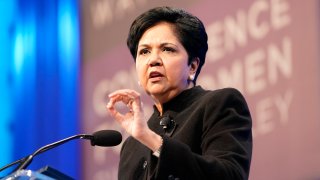
- Former PepsiCo CEO Indra Nooyi has called the coming decades "the decades of women" as economies move into a new phase of growth.
- The Indian-American businesswoman said Covid-19 has served to change the playing field for women at work.
- Nooyi shared her three-step advice for helping companies and countries create a more inclusive environment for women.
As economies move into a new phase of growth, the next 20 years will be "the decades of women," says former PepsiCo Chief Executive Indra Nooyi.
The Indian-American businesswoman said the coming years mark an inflection point for women as society seeks to recover from the pandemic while simultaneously addressing demographic challenges. She also urged companies and countries to get behind the change.
"I don't believe there's any economy in the world that can be successful without tapping into the incredible potential of women going forward. I just don't believe that's possible," said Nooyi, a regular fixture among the ranks of the world's most powerful women.
"I also think almost every economy in the world needs women to have children too, because we need the replacement rate for the world," she continued. "We ought to sit down and say to ourselves: 'They need us.' They need us for the economy, they need us to have kids, and we put in all the unpaid labor so far. So I look at the next couple decades and say 'it's our time.'"
Nooyi was speaking at a virtual event organized by Procter & Gamble and United Nations Women entitled #WeSeeEqual.
Narrowing the gender gap
Money Report
In a report last year, the UN predicted that the coronavirus pandemic has more adversely impacted women than men, further exacerbating existing gender disparities.
However, Nooyi — who was widely praised for her transformation of PepsiCo, including its diversity and inclusion agenda — said companies and countries have the opportunity to help reduce the gap by focusing on three key areas.
"First, every company and every government should insist on paid leave," she said, highlighting paid maternity, paternity, and family leave as critical.
"Secondly, thank God for Covid, now we have flexibility," she continued, noting that flexible work can open up huge participation opportunities for women. That doesn't just mean shifting the office to the home, but enabling hybrid work models and flexi-time so workers can "find a new equation" that works for them, she said.
"The third most important is childcare facilities," she said.
Those three elements have to work in tandem to create change, said Nooyi. But she's hopeful: "I would say it's going to be a different world; there's going to be a lot more equality than we saw before."






